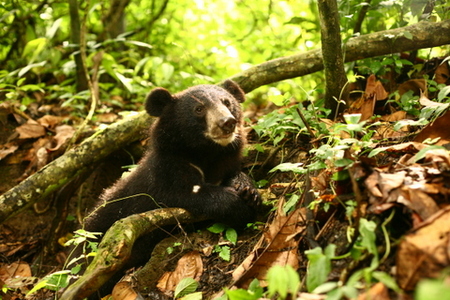Manas (Bodoland, Assam), May 1, 2014: Three orphaned Asiatic black bears cubs (Ursus thibetanus) were moved into the wild in Manas National Park, today.
The cubs were found alone in Mayanpara, Siyalmara and Kumarikhata villages in the fringes of the UNESCO World Heritage in December last year. With their mothers presumably killed, the cubs had been restrained and handed over to the Forest Department and IFAW-WTI for care and rehabilitation.
IFAW-WTI has rehabilitated 31 Asiatic black bear cubs in the northeast Indian states of Assam and Arunachal Pradesh till date. The cubs were hand-reared, and following a gradual acclimatisation process involving daily walks into the forest accompanied by IFAW-WTI animal keepers, released back into the wild. The cubs were monitored post-release for a period of around six months with the help of radio-collars.

Six cubs are currently being walked back to the wild in Mehao Wildlife Sanctuary in Arunachal Pradesh.
“These three cubs however will not undergo the methodology used for earlier bear cubs,” said Dr Bhaskar Choudhury, IFAW-WTI Regional Head – Northeast India. “The release following acclimatisation through daily walks is applicable to cubs brought under human care at a very young age. These cubs were all nearly a year old when admitted.”
The cubs are currently in an in situ enclosure fabricated at the release site in Doimari range. They will be acclimatised here for a few weeks. They will then be radio-collared and released from the enclosure.
“Following their release, we will be monitoring their survival and foraging pattern,” said Dr Panjit Basumatary, IFAW-WTI veterinary surgeon, adding that the bears were healthy and aggressive, indicating their wild nature.
The number of Asiatic black bear cub rescues indicates a worrisome trend in northeast India. Poaching for body parts predominantly bile, habitat degradation and conflicts with people are known to be among the major threats to bears in general.
The Asiatic black bear is classified as ‘vulnerable’ in the IUCN Red List of threatened species, and is protected under Schedule I of the Indian Wildlife (Protection) Act, 1972.